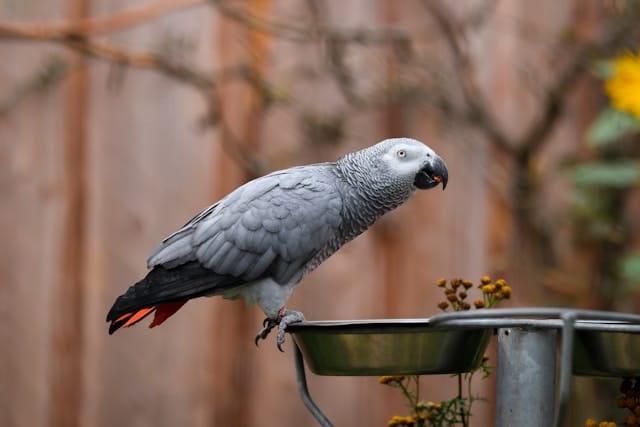Caring for an African grey parrot requires a deep understanding of their dietary needs and habits. As bird enthusiasts, you are well aware that the type of bird feeder you choose plays a crucial role in the health and happiness of your pet. This article is here to guide you on how to choose an appropriate bird feeder that will cater to the specific needs of your African grey parrot.
Understanding Your African Grey Parrot
Before we delve into the details of the right bird feeder, let’s first get to know your African grey parrot. This class of bird is indigenous to the dense rainforests of West and Central Africa. They are one of the most intelligent birds in the world, renowned for their ability to mimic human speech and sounds.
A lire également : What Are the Key Diet Considerations for a Cat with Hyperthyroidism?
Their intelligence, however, goes beyond just mimicking. They require mental stimulation and interaction, both with their human caregivers and their environment. The type of feeder you choose will play a significant role in providing this much-needed mental stimulation.
Considerations in Choosing a Bird Feeder
When choosing a bird feeder for your African grey parrot, there are several factors to consider. Firstly, the feeder must be easy to clean. Parrots are known for their messy eating habits, and a clean feeder is vital to prevent the growth of harmful bacteria.
A lire aussi : How to Set Up a Safe and Stimulating Play Area for Young Puppies?
Secondly, the feeder should be sturdy and resilient. African greys are known to be strong chewers, so you’ll need a feeder that can withstand their powerful beaks.
Thirdly, the feeder should be easy for the bird to use. Some feeders are designed with multiple compartments to stimulate the bird’s problem-solving skills. This can be beneficial for African greys as it provides mental stimulation.
Types of Feeders: Seeds vs. Pellets
The type of food you intend to feed your African grey parrot will also determine the kind of feeder you should choose. Most parrots eat a diet composed of seeds, pellets, fruits, vegetables, and occasional treats.
Seed feeders are usually designed with multiple compartments to prevent the bird from picking out only their favourite seeds and neglecting the rest. However, African greys are known to prefer pellets over seeds due to their richer nutritional profile. Therefore, a pellet feeder may be a more suitable choice.
When choosing a pellet feeder, consider one with a feeding station where the bird can perch and eat comfortably, but also easy to clean. Some feeders come with a removable tray that catches any dropped pellets, making cleaning easier.
Water Feeders
Like their food counterparts, water feeders are essential in the cage of an African grey parrot. Parrots need to drink water daily, and a specialized water feeder ensures they have a fresh supply.
There are various types of water feeders available, but the most common are bottle-style feeders and dish-style feeders. Bottle-style feeders are designed to prevent water from being contaminated by food and droppings, but they can be challenging for some birds to use. Dish-style feeders are easier to use, but they can quickly become dirty.
Regardless of the type, ensure the feeder is easy to clean, easy to refill, and large enough for your African grey to drink from comfortably.
Fun and Interactive Feeders
In addition to the basic food and water feeders, consider incorporating fun and interactive feeders into your African grey’s cage. These can include puzzle feeders, treat-dispensing toys, and foraging feeders.
These types of feeders provide essential mental stimulation for your bird, which can prevent boredom and related behavioral issues. They also encourage natural foraging behavior, which is a crucial aspect of an African grey’s lifestyle in the wild.
When choosing an interactive feeder, ensure it is suitable for the size and intelligence level of your African grey. The feeder should be challenging but not frustrating for your bird.
Choosing the right bird feeder for your African grey parrot is more than just a purchase decision. It is a commitment to providing your pet with the best possible care and to promote their overall well-being. By understanding your parrot’s needs and considering them in your choice of feeder, you are taking an essential step in ensuring their happiness and health.
Making Your Selection: Practical Factors and Aesthetics
It’s crucial to strike a perfect balance between the practicality and aesthetics of the bird feeder you choose for your African grey. Besides the factors already mentioned, you should also consider the size of your parrot’s cage and its overall design. The feeder should not only fit comfortably within the cage but also match its design.
When browsing through various options, pay special attention to the feeder’s durability. African greys have powerful beaks, and anything they can easily destroy may not only be a waste of money but can also pose a risk to their health. Always opt for feeders made from sturdy, non-toxic materials.
The placement of the feeder is also important. Position the feeder at a height that is comfortable for your African grey parrot. It should be accessible yet not too low that it encourages the bird to forage on the cage floor, a behavior that should be discouraged.
Lastly, don’t forget to factor in your personal preferences and budget. There’s a broad range of bird feeders available in the market today, each with its own unique set of features and prices. Choose a feeder that not only meets your African grey’s needs but also aligns with your aesthetic preferences and budget.
Conclusion: A Commitment to Your African Grey Parrot’s Well-Being
Choosing the right type of bird feeder for your African grey parrot is a crucial step in ensuring their overall happiness and health. While it may seem like a daunting task initially, understanding your bird’s needs can make the process simpler and more fulfilling. Whether it’s a basic seed feeder or a more complex interactive feeder, remember that the ultimate goal is to provide a safe and stimulating environment for your beloved pet.
In conclusion, ensure that the feeder you choose is easy to clean, sturdy, and accommodates both the dietary needs and the intelligence level of your African grey parrot. Fun and interactive feeders can add an extra layer of excitement and mental stimulation for your bird, promoting their natural foraging behavior.
As an informed bird enthusiast, you can now confidently select a bird feeder that will cater to the specific needs of your African grey parrot. Remember, every choice you make, from the type of feeder to its placement in the cage, plays a crucial role in your parrot’s well-being. Your commitment to understanding and meeting your bird’s needs is a reflection of your love and care for your African grey. So, take this step with confidence and joy, knowing that you are providing the best care possible for your feathered friend.











